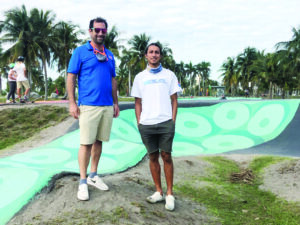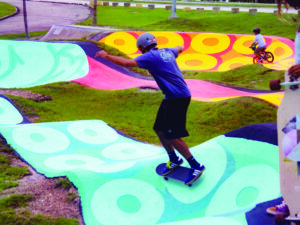Prevention and collaboration are at the core of the KiDZ Neuroscience Center, a youth-focused branch of The Miami Project to Cure Paralysis headed by Gillian Z. Hotz, Ph.D. and dedicated to reducing the number of children and adolescents that sustain brain and spinal cord injuries. KiDZ is now a Miami Project staple, launched in 2001 and since establishing and sustaining partnerships with Miami-Dade Public Schools, City of Miami Parks, the Miami Dolphins Foundation, and seemingly countless other community organizations in the South-East Florida region and beyond. In accordance with our ethos and historical precedent, KiDZ has continued to adapt to recent trends and expand in response to circumstance, as well as vision.
Prevention means intervening when and where it matters most, and the KiDZ Neuroscience Center’s WalkSafe and BikeSafe programs have for years been delivering interventions at the earliest possible point. Targeting children—as well as their families and communities—these programs have a rich history of bringing street, crosswalk, bicycle, and helmet education to the youth in their natural environment. Continuing to meet them where they’re at, KiDZ has recently added SkateSafe to their list of programming in response to a surge of skateboarding interest likely ushered in by the recent Olympics. The 2020 Tokyo Games were the first to include stakeboarding as an event, with mandatory helmet regulations for the popular under-18 competitors. Not only has KiDZ continued to cater to the community by adapting to the rising demand of skateboarding, but the programming is also delivered on site at skateparks. Haulover Beach Park Stake Park and Pump Track, located at 10801 Collins Ave, is a local’s-favorite series of undulations and embankments expertly crafted into a flowing asphalt playground by Jonathan Strauss of Skateboard Supercross fame. In a mural to match, local artist Reinaldo (“Rey”) Jaffet interwove the winding course with a writhe of octopus tentacles that carry subtle neuroscience messaging and a helmeting call-to-action.
While responding to demand is a staple of participatory research, many KiDZ programs are also proactive. At Haulover, KiDZ has helped outfit the park with a volunteer “skateguard” (a homage to Miami’s lifeguards). In the community, they are pushing for safer streets as a more fundamental preventative measure than the street safety that they have been educating for so long. “It’s no longer just about teaching users to be safe on dangerous roads,” says Kurt Kaminer, KiDZ Social Marketing Manager and all-around transportation guru, “it’s about realizing how roads can be safely designed for all users.” Mr. Kaminer’s message deeply summarizes the preventative and collaborative themes that are exemplified in KiDZ and run throughout the whole of The Miami Project. We hope you were able to catch WalkSafe’s notorious “Halloween tips” flyer that is seasonally released during that one day when the streets are reclaimed by the people, and cars are simply the guests. Just as the holidays are a use-case evoking community efforts in neurotrauma prevention, so too is KiDZ Neuroscience Program a model for the interdisciplinary and visionary ethos of The Miami Project.



